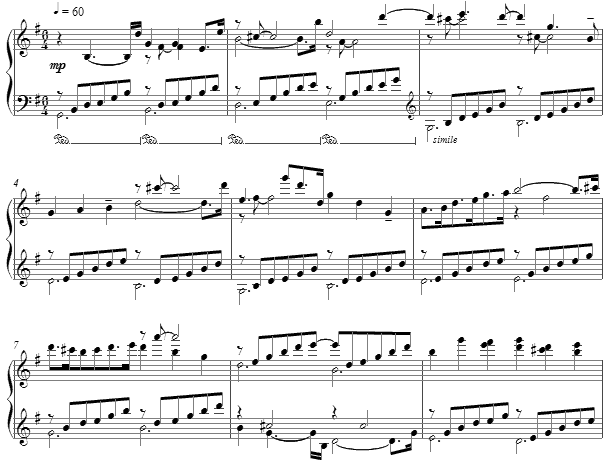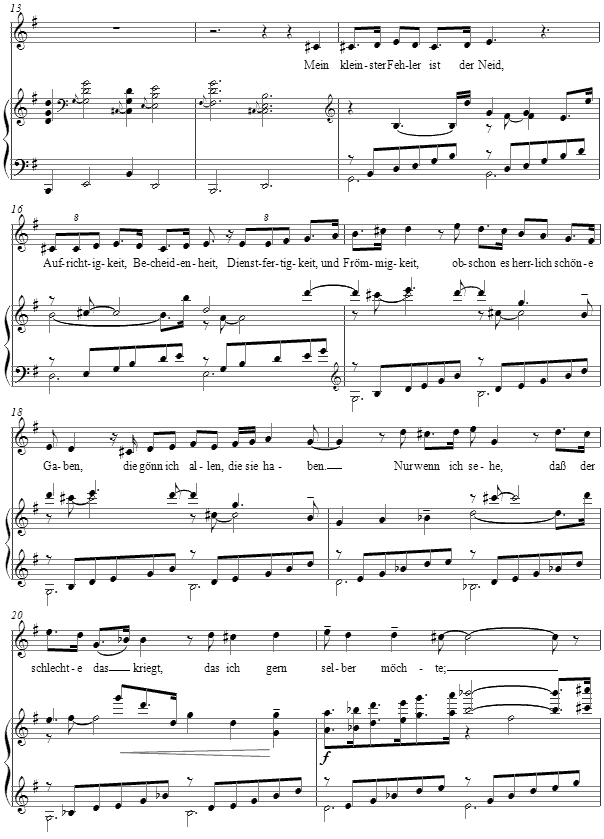Music and Texts of GARY BACHLUND
Vocal Music | Piano | Organ | Chamber Music | Orchestral | Articles and Commentary | Poems and Stories | Miscellany | FAQs
Mein kleinster Fehler - (2007)

Wilhelm Busch
for medium high voice and piano
Sigrid Clar gewidmet
Mein kleinster Fehler is der Neid. --
Aufrichtigkeit, Bescheidenheit,
Dienstfertigkeit und Frömmigkeit,
Obschon es herrlich schöne Gaben,
Die gönn ich allen, die sie haben.
Nur wenn ich sehe, daß der Schlechte
Das kreigt, was ich gern selber möchte;
Nur wenn ich leider in der Nähe
So viele böse Menschen sehe,
Und wenn ich dann so oft bemerke,
Wie sie durch sittenlose Werke,
Den lasterhaften Leib ergötzen,
Das freilich tut mich tief verletzen.
Sonst, wie gesagt, bin ich hienieden
Gottlobunddank so recht zufreiden.
[ 3 pages, circa 3' 20" ]
Wilhelm Busch
Wilhelm Busch (1832-1908), born in Wiedensahl near Hannover, and dies in Mechtshausen, was a German painter, sculptor and poet who is known for his satirical picture stories. After studying first mechanical engineering and then art in Düsseldorf, Antwerpen and Munich, he turned to drawing caricatures. Busch worked for the periodicals, Fliegenden Blätter and Münchner Bilderbogen. One of his first picture stories, Max und Moritz (published in 1865), was an enormous and popular success. Max und Moritz as well as many of his other picture stories are regarded as one of the main precursors of the modern comic strip. Max und Moritz, for instance, became an inspiration for the Katzenjammer Kids. Many of his poems are in a similar style to his picture stories, satirical and comic. Along with his popularly received works, Busch produced more than 1,000 oil paintings that were sold only after his death. Below is Busch's own caricature of himself.
Busch by Busch
This poem is ironic, of course, as the speaker bemoans what today is sometimes popularly spoken of as the question, "Why to good things happen to bad people?" Busch however reminds us that such a question is, in part, jealousy.
My smallest failing is jealousy. --
Sincerity, modesty,
Craftsmanship, piety,
Obviously the greatest of God's gifts,
All of which I am pleased to have.
Only when I see, that which the worst
Have acquired, that which I wish I had;
Only when I am sadly see
Such awfully bad men all round me,
And when I so often take notice,
How through their immoral works
They are so enthralled with their own depravity,
Then truly am I wounded.
Here below am I, therefore,
So ready to be praising God.
The setting opens with a pleasantly "spiced" prelude in the major tonic, as the additional tones not a part of the figuration create small dissonances within the gestures.
As the confession of the text comes to be played out, the gestures twist towards the parallel minor, and dissonances become slightly more pronounced. That jealousy of which Busch tells us becomes a slowly revealed anger and envy as the dynamics are raised alongside the tessitura for the vocal part, and the addition of octaves in the right hand of the accompaniment, until finally relief from these tensions comes in the prideful boast of reliance of religious belief for the easing of this jealousy.
The score for Mein kleinster Fehler in the high key is available as a free PDF download, though any major commercial performance or recording of the work is prohibited without prior arrangement with the composer. Click on the graphic below for this piano-vocal score.



